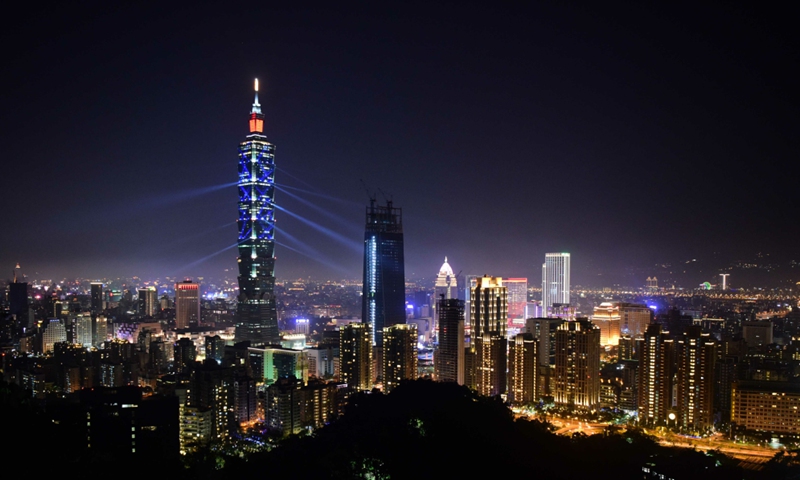Taipei now under Washington’s deep control: former cross-Straits official
By Xie Rongbin and Wu Wei Source: Global Times Published: 2020/7/8 8:28:57

File photo of the Taipei 101 skyscraper in Taipei, southeast China's Taiwan. Photo: Xinhua
This year events affecting relations across the Taiwan Straits have not been positive. There were the reelection of secessionist Taiwan leader Tsai Ing-wen, the election defeat of Kaohsiung Mayor Han Kuo-yu, politicized and highly inappropriate interactions between the US and the island, and the unfortunate impact of the COVID-19 pandemic.
High on the list of concerns for the coming years include US meddling in the Taiwan question and how the mess in Hong Kong will affect cross-Straits relations.
Global Times reporters (GT) discussed these questions with Wang Zaixi (Wang), former deputy director of the Association for Relations Across the Taiwan Straits of the State Council and vice president of National Society of Taiwan Studies, in an exclusive interview.
GT: Many analysts attribute Tsai's election victory to the mess in Hong Kong. We have noticed that Hong Kong issues seem to have played an important role in the cross-Straits relations over the last year. What's your take on this?
Wang: Two things did objectively help Tsai win the election even though she achieved nothing over the past four years: one was the riots in Hong Kong, the other was the deteriorating China-US relationship.
The Tsai authority jumped on the riots that happened in Hong Kong with support from external forces including the US and the UK. It slandered the efforts of Hong Kong police in stopping the riots, calling it a "crackdown on democracy and freedom." As most participants of the rioters were local young students, Taiwan media focused mainly on the scenes of Hong Kong police arresting these students, which frightened some young people on the island.
Taiwan's separatist Democratic Progressive Party (DPP) authority smeared the "one country, two systems" under that circumstance, which misled and deceived many voters especially the young people.
Tsai also intentionally confused the 1992 Consensus with the "one country, two systems," and attacked the island's parties that advocate for improving relations across the Straits suggesting those who are "pro-China [-mainland] betray Taiwan," which left Han Kuo-yu, the Kuomintang (KMT) candidate in a passive position.
The 1992 Consensus clearly requires adherence to the one-China principle and seeking national reunification. "One country, two systems" is an institutional arrangement that would come after reunification, and is totally different from the 1992 Consensus. Tsai's intentional conflating of the two concepts reflects her sinister motives.
GT: Washington has stepped up arms sales to Taipei and has passed several acts friendly to the island in recent years. The two sides even jointly went against the World Health Organization (WHO) amid the COVID-19 pandemic. Do you think Trump's actions are merely aimed at winning reelection or are there some other political ends?
Wang: I think these actions are not only about getting reelected, the main purpose is containing China, and Trump would still take these actions even if he wasn't running for reelection. For Washington, playing the "Taiwan card" costs little and is very damaging to Beijing.
Washington's Taipei-related acts, such as the "Taiwan Travel Act," "Asia Reassurance Initiative Act," and the "Taipei Act" which he US Congress passed in recent years, as well as the "National Defense Authorization Act" that Trump signed, have made relations between Washington and Taipei a semi-official one. Trump has also sold weapons and equipment worth $13.8 billion to Taiwan, creating conditions for the DPP authority to "reject unification by force."
The Tsai authority knows that Taiwan cannot compete with the mainland on its own, and therefore turns to Washington and is willingly to be used. Taipei is actually now under Washington's deep control.
GT: After a failure in the election at the beginning of this year, KMT's candidate Han Kuo-yu was removed from office in a voter recall vote. It is reported that the US supported the removal of Han, so that US warships can dock at Kaohsiung Port. How will the removal of Han affect relations across the Taiwan Straits, and relations between the island of Taiwan and the US?
Wang: The ouster of Han was another disaster for the KMT, and the DPP's separatist dogma will be more aggressive. But the dominance of DPP will also lead to its downfall. Han recognizes the 1992 Consensus and supports improving the Cross-Straits relations. The election of Chen Chi-mai, a DPP member as the mayor of Kaohsiung will cast a negative influence on cross-Straits relations.
As far as relations between the island of Taiwan and the US, I believe there would be no big difference under the KMT or DPP rule as they share common ground - they're both pro-US.
Posted in: SOCIETY,CHINA FOCUS